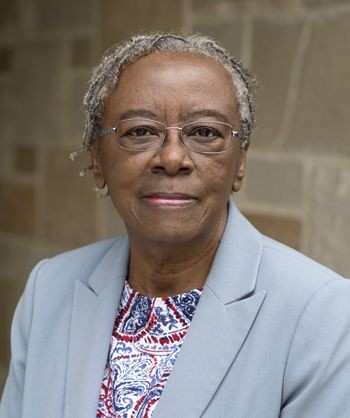The 20th annual Diversity Challenge, a national conference organized by Boston College’s Institute for the Study and Promotion of Race and Culture that takes place online October 23-24, spells out the urgency of its task in this year’s brochure: “Racism, racialized ethnocentricity, and xenophobia have spread their tentacles of oppression in virtually every domain in U.S. society.
“Over the years, we have convened to share scholarship, mental health interventions, educational strategies, and social justice community advocacy to foster our shared efforts to move toward a mutual goal of ending racial and ethnic cultural oppression in whatever forms they occur.”
ISPRC, also celebrating its 20th anniversary, was launched with the Diversity Challenge as its centerpiece to promote the assets and address the societal conflicts associated with race and culture in theory and research, mental health practice, education, business, and society at large.
ISPRC Director Janet E. Helms explains that this year’s convening—“Goodbye ‘isms,’ Hello Future!”—will challenge participants “not to only imagine a future world without racial-cultural oppression, but also to share their work, thoughts, or presence to make a reality of that which we can imagine, toward the goal of ending racial-cultural domination in the future.

ISPRC Director Janet Helms. Photo by Christopher Soldt
“It’s also a two-decade celebration of what all previous attendees have done over the years to keep racism and ethnocentrism—and the many social categories and domains with which they intersect—in the forefront of society’s consciousness,” said Helms, the Augustus Long Professor at the Lynch School of Education and Human Development.
The Diversity Challenge will feature a deep and robust roster of invited panelists and speakers, including Robert Carter, retired chair of the Department of Counseling and Clinical Psychology and director of training at the Counseling Psychology Program at Teachers College, Columbia University, who is known worldwide for his work on assessing racial trauma; University of Maryland Assistant Dean for Diversity Kim Nickerson, the former director of the American Psychological Association’s Minority Fellowship Program; San Francisco State University Department of Counseling Professor Rebecca Toporek, co-author of Taking Action: Creating Social Change through Strength, Solidarity, Strategy & Sustainability; and Francie Latour, Broad Institute diversity initiative coordinator and author of Auntie Luce’s Talking Paintings, a bi-cultural, bi-geographic illustrated children’s book.
Additional speakers include neuropsychologist Hector Adames, co-director of the Immigration Critical Race and Cultural Equity Lab and editor of Latinx Psychology; Karen Suyemoto, a professor of psychology and Asian American Studies and director of the Transnational Cultural and Community Studies graduate program at the University of Massachusetts-Boston; and Alvin Alvarez, dean of the College of Health & Social Sciences, San Francisco State University.
“ The institute is unique in its emphasis on addressing psychological issues related to race and ethnic culture from an interdisciplinary perspective. In the social policy arena, race and culture are too often treated as human deficiencies rather than potential resources. ”
The 2020 Diversity Challenge comes in the wake of the killings of George Floyd, Breonna Taylor, and Ahmaud Arbery, and the police shooting of Jacob Blake, Helms noted, each distressing reminders of the rationale for the development of ISRPC’s Racial Trauma Toolkit, a resource for communities of color trying to cope with these repeatedly devastating experiences.
Understanding that racial trauma is an urgent public health concern that has serious consequences for the well-being of people of color, the ISPRC Alumni Advisory Board launched the downloadable #racialtraumaisreal kit in 2015, a direct response to the 2014-15 deaths of Michael Brown, John Crawford III, Eric Garner, Aiyana Stanley-Jones, Yvette Smith, Walter Scott, and Freddie Gray, as well as the lack of indictments of the police officers involved in several of these deaths.
“Regardless of a person’s previous understanding of racism, many people of color may find themselves struggling to process their reactions to these deaths,” said Helms. “Anger, sadness, fear, feelings of helplessness, exhaustion, rage, and the desire to act may emerge at unpredictable times in an unpredictable manner.
“The Racial Trauma Toolkit offers the recommendations of mental health professionals and advocates of the study and promotion of racial and cultural understanding, and speaks to the broad mental health impact we as a community are experiencing as witnesses, participants, and mental health practitioners.”
The ISPRC has been engaged in a variety of team initiatives, including a mentoring and advocacy program at Dorchester’s Jeremiah E. Burke High School; the Race Culture Challengers, a team formed to empower people to create and navigate conversations and spaces that address aspects of race and culture; and a student-led advocacy program developed to support and empower international graduate students.
“The institute is unique in its emphasis on addressing psychological issues related to race and ethnic culture from an interdisciplinary perspective,” said Helms. “In the social policy arena, race and culture are too often treated as human deficiencies rather than potential resources.”
Find more about the Institute for the Study and Promotion of Race and Culture, and the Diversity Challenge, at bc.edu/isprc.
Phil Gloudemans | University Communications | October 2020



